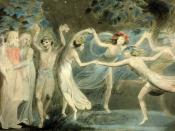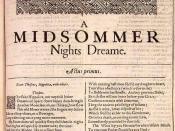Finding Ourselves in Shakespeare's "All's Well That Ends Wel"l, "Macbeth", "Much Ado About Nothing", and "Hamlet".
Who are we? Paul Simon said, "I am a rock." John Lennon said, "I am the walrus." Steve Miller said, "I'm a joker, I'm a smoker, I'm a midnight toker." Richard Nixon said, "I am not a crook." Basically, it boils down to this: people naturally don't really know who they are, or really are. These metaphorical song lyrics (excluding Tricky Dick) seem to be searches at an explanation of the self. People have been attempting to secure their identities forever. At first this search seemed synonymous with a search of an origin. Religious doctrines were devised to explain who people are and if not, how they should be. However, one's identity or soul or true self is not a stagnant or secure identity. One's character or self is always apt to evolve with age and experience, or quicker, depending on situations like if one is drunk (Cassio), etc.
The ambiguity of people's personage is a theme Shakespeare explores in most of his works. He does so with many means: the use of costumes, magic, dishonesty, and most often with confusion. Characters in Shakespeare are never what they seem. Hamlet says, "I know not 'seems.'" Iago says, "I'm not what I am." Henry V says, "Presume not that I am the thing I was."
What Shakespeare seems to be doing is breaking down identities. We develop a discourse of pattern-based predictions about who people are and how they will behave. When people act differently or out of our perception of their character we assume something is wrong. We all fester a natural tendency to seek black and white or at least know where people stand. Trust and honesty, declared and respected virtues, are based...


